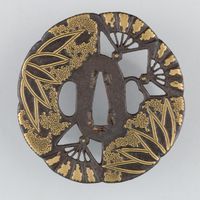
Double-Barreled Flintlock Shotgun with Exchangeable Percussion Locks and Barrels
Nicolas Noël Boutet
An item at Metropolitan Museum of Art
Perhaps the richest and most beautiful gun from the last phase of Boutet’s long career, this firearm was made by him after the Restoration of the monarchy in France in 1815. Its exuberant decoration is reminiscent of the style fashionable before the revolution in 1789. The gun was so appreciated by its owner that, in 1860, he commissioned a group of skillful gunmakers to produce a similarly decorated set of barrels and locks using percussion caps, an advanced method of ignition developed after 1820.
Arms and Armor
An exhibit at Metropolitan Museum of Art
The principal goals of the Arms and Armor Department are to collect, preserve, research, publish, and exhibit distinguished examples representing the art of the armorer, swordsmith, and gunmaker. Arms and armor have been a vital part of virtually all cultures for thousands of years, pivotal not only in conquest and defense, but also in court pageantry and ceremonial events. Throughout time the best armor and weapons have represented the highest artistic and technical capabilities of the society and period in which they were made, forming a unique aspect of both art history and material culture.




